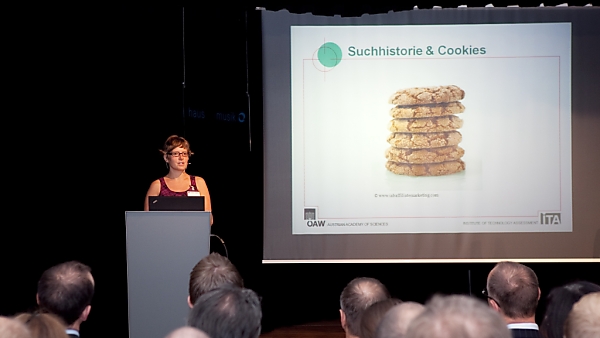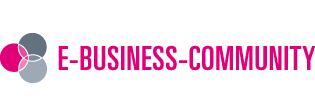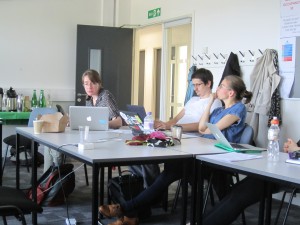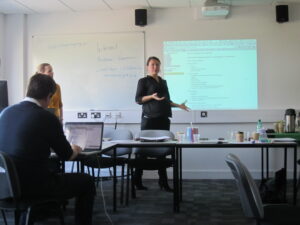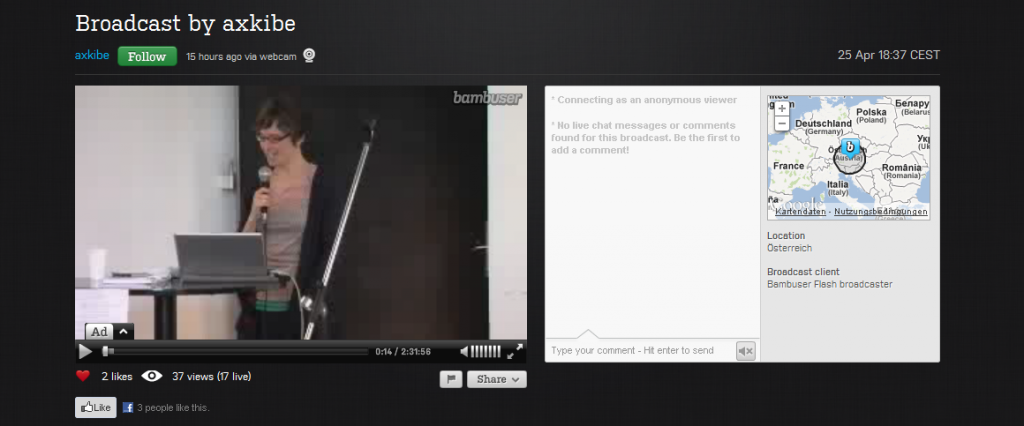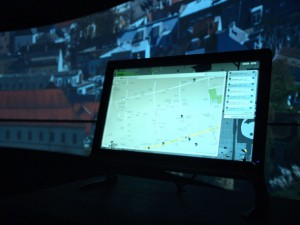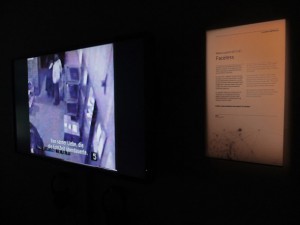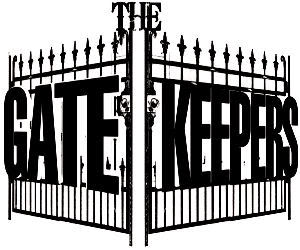Last week I attended an excellent conference in Uppsala/ Sweden organized by Christian Fuchs and colleagues. The conference was concerned with “Critique, Democracy, and Philosophy in 21st Century Information Society” (all conference abstracts could be found online) or “Marx is Back”, as the opening panel suggested. Accordingly, numerous scholars from various disciplines – old and young – discussed Marx, Marcuse, and many other thinkers in the tradition of Critical Theory in the context of new media and Internet technologies. In fact, developing critical theories of social media was the main purpose of the gathering.
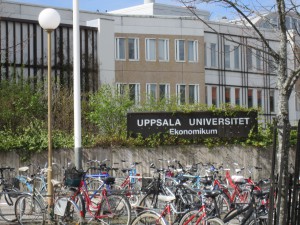
Contrary to other Internet-related and social media events, this conference was hence saturated with philosophy, theory and critical thinking. Theoretical papers were mixed up with empirical studies scrutinizing corporate Internet services including big players like Google, Facebook and co., but also alternative technologies such as Diaspora, Crabgrass and others. Issues discussed ranged from user exploitation, commodification of social relations, free labour, knowledge workers, crowdsourcing of surveillance, privacy, data protection, ideologies, capitalist modes of production, creation of surplus value in the digital age, pratices of resistance, revolution, social movements, ethics 2.0, circuits of struggle, the commons, participation, and the long march towards a sustainable, democratic information society.
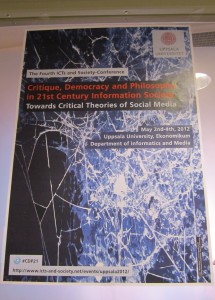 The line-up of keynote speakers was impressive! I particularly enjoyed the following lectures: by Vincent Mosco, who posed the central question whether knowledge workers will unite and suggested to focus on strategies and tactics for activism. By Graham Murdock, who talked about the privatization of the commons and the promotional enclosure of everyday life. By Charles Ess, who analyzed privacy and collective property in the context of Western and Eastern developments. By Christian Fuchs, who underlined – once again – that Marxian thinking is crucial in contemporary informational capitalism and hence advised Castells and Jenkins to read Marx in order to develop more critical concepts. By Trebor Scholz, who talked about the Internet as playground and factory and pictured us, the users, as “renting the product of our own labour” and demanded hybrid (public/ private) solutions for the future. By Mark Andrejevic, who made us think about the “big data divide”, predictive analytics, and the question who has access to big data (corporations) and who has not (e.g. researchers). By Andrew Feenberg, who conceptualized the Internet as a site of struggle between the consumption model and the community model and suggested (following Marcuse) to “enter the institutions and contest them from within” – whether that would also include entering corporations and contesting them from within remained open though. For the keynote talks I didn’t mention – because I missed and/ or treated them shabbily see Christian Fuchs’ comprehensive article on the tripleC website (Journal for a Global Sustainable Information Society).
The line-up of keynote speakers was impressive! I particularly enjoyed the following lectures: by Vincent Mosco, who posed the central question whether knowledge workers will unite and suggested to focus on strategies and tactics for activism. By Graham Murdock, who talked about the privatization of the commons and the promotional enclosure of everyday life. By Charles Ess, who analyzed privacy and collective property in the context of Western and Eastern developments. By Christian Fuchs, who underlined – once again – that Marxian thinking is crucial in contemporary informational capitalism and hence advised Castells and Jenkins to read Marx in order to develop more critical concepts. By Trebor Scholz, who talked about the Internet as playground and factory and pictured us, the users, as “renting the product of our own labour” and demanded hybrid (public/ private) solutions for the future. By Mark Andrejevic, who made us think about the “big data divide”, predictive analytics, and the question who has access to big data (corporations) and who has not (e.g. researchers). By Andrew Feenberg, who conceptualized the Internet as a site of struggle between the consumption model and the community model and suggested (following Marcuse) to “enter the institutions and contest them from within” – whether that would also include entering corporations and contesting them from within remained open though. For the keynote talks I didn’t mention – because I missed and/ or treated them shabbily see Christian Fuchs’ comprehensive article on the tripleC website (Journal for a Global Sustainable Information Society).
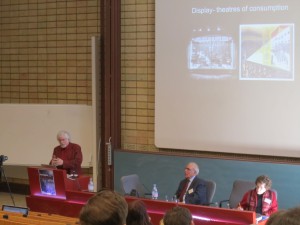
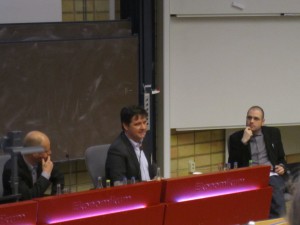
The parallel sessions were yet not less interesting! (Again, the list won’t be complete since I didn’t attend all of them.) I liked the “Antagonistic Lives of Knowledge Workers” and its discussions on knowledge struggles on web 2.0 platforms (Brian Loader), affective labour and self-promotion of young academics on Twitter, Blogs & Facebook (Mike Frangos) and Romanian journalism in a digital era (Romina-Gabriela Surugiu). “Surveillance 2.0” featuring an excellent talk on the ideological packaging of ICTs (Heidi Herzogenrath-Amelung and Pinelopi Troullinou), empirical case studies on social media use & privacy in Austria (Verena Kreilinger and Thomas Allmer) and, last but not least, a presentation on theorizing social media policing mentioning amazing – and truly frightning – cases of crowdsourcing surveillance such as the Internet Eyes in the UK (Daniel Trottier). Finally, my own panel “Commodification and Ideology” was really cool; covering, among other issues, time conflicts and global capitalism (Wayne Hope), corporate social (ir)responsibility and its problems (Marisol Sandoval), and the alienated labour of academic publishing (Wilhem Peekhaus). Moreover, I got great feed-back and food for thought after my own presentation on algorithmic ideology including comments on hierarchical features of Žižek’s theory and the need for democratic algorithms and alternative (net) politics – Christian Fuchs would call it Communism, I suppose.

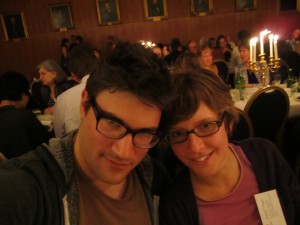 Accordingly, at the conference dinner the Internationale was played and everyone stood up to it. A truly amazing conference, as I said. Thanks to everyone – Christian, Marisol, … – who made this event happen!!! I’ll be there for the next one (assuming there is another ICTs & society conference since there were other events in the past; see once again Christian’s review)! Finally, it was great meeting Ramon Rodriguez-Amat and Katharine Sarikakis from the Communication Studies department in Vienna (let’s unite indeed!!!) & it was fun hanging out with Mike in Stockholm.
Accordingly, at the conference dinner the Internationale was played and everyone stood up to it. A truly amazing conference, as I said. Thanks to everyone – Christian, Marisol, … – who made this event happen!!! I’ll be there for the next one (assuming there is another ICTs & society conference since there were other events in the past; see once again Christian’s review)! Finally, it was great meeting Ramon Rodriguez-Amat and Katharine Sarikakis from the Communication Studies department in Vienna (let’s unite indeed!!!) & it was fun hanging out with Mike in Stockholm.
 I’ve been invited to moderate the track “technology and regulation” at the Momentum 13 symposium. I’ve never heard of this conference before, but it seems to be an exciting platform for political discourse concerning societal challenges of all sorts. Its panelists include scientists, policy makers, activists and labor unionists. This year’s topic is “progress” in its broadest sense. The abstract on their website reads like this:
I’ve been invited to moderate the track “technology and regulation” at the Momentum 13 symposium. I’ve never heard of this conference before, but it seems to be an exciting platform for political discourse concerning societal challenges of all sorts. Its panelists include scientists, policy makers, activists and labor unionists. This year’s topic is “progress” in its broadest sense. The abstract on their website reads like this:
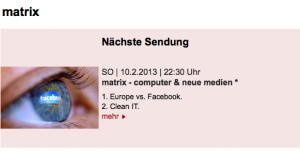
 It will go on air on Sunday, 10.02., at 22:30 pm; radio station Ö1. Or, alternatively, you could also follow the program online. I’m not sure if there’ll be a podcast available right after, but if so I’ll post the link. You’ll find more information on the program
It will go on air on Sunday, 10.02., at 22:30 pm; radio station Ö1. Or, alternatively, you could also follow the program online. I’m not sure if there’ll be a podcast available right after, but if so I’ll post the link. You’ll find more information on the program 